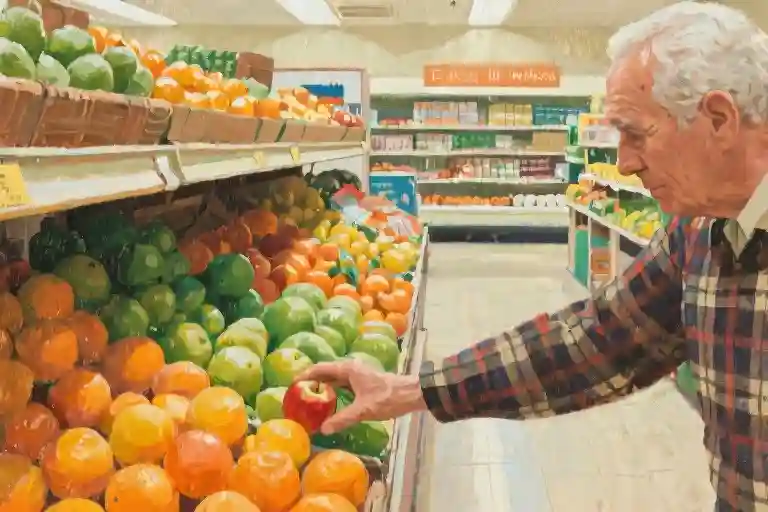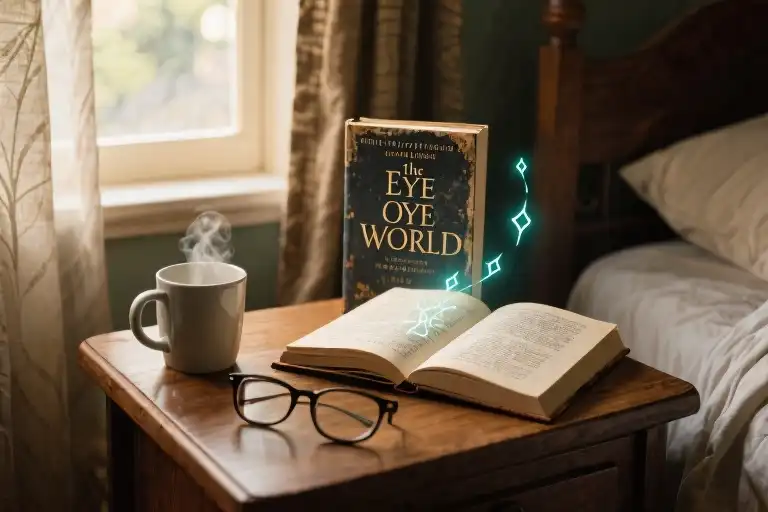The automatic sliding doors would part with their familiar sigh, and there he’d be – that gap-toothed grin floating above the citrus display like some benevolent grocery store ghost. Every Thursday evening, without fail, Ernest would materialize in the produce section, his grey hair catching the fluorescent lights as he inspected cantaloupes with the focus of a diamond appraiser.
He spoke to me in that particular way some older gentlemen reserve for children – not the high-pitched baby talk most adults affect, but a warm, conspiratorial tone that made me feel like we were sharing some grand secret about the relative merits of Honeycrisp versus Granny Smith apples. His voice carried the texture of well-worn flannel, syllables tumbling out slightly lopsided through the gap in his front teeth.
These encounters became as much a part of our weekly routine as the clatter of shopping carts and the beep of the checkout scanners. My father would nod at him over the avocado bin, their exchanges brief but familiar, leaving me to wonder whether they’d known each other before the grocery store or if this was simply what adulthood looked like – these easy, uncomplicated connections formed in the most ordinary places. The fruit aisle became our neutral territory, where the simple act of selecting peaches could transform into something resembling ceremony.
What strikes me now, decades removed from those Thursday produce section summits, is how thoroughly Ernest inhabited that space. The grocery store didn’t diminish him; he seemed to expand to fill it, his laughter bouncing off the cereal boxes, his presence making the whole fluorescent-lit arena feel momentarily enchanted. At the time, I took this magic for granted – just another quirk of the adult world that made no particular sense to a child. Only later would I understand how rare it is to encounter someone who carries their joy so openly, so unselfconsciously, between the discount stickers and coupon dispensers.
A Grandfather Without a Name
The produce section of our local grocery store became my weekly theater, with Ernest as its most reliable performer. His appearance never varied – that shock of steel-gray hair standing at attention like a wheat field in the wind, the prominent gap between his front teeth that made his smile resemble a jack-o’-lantern’s cheerful grin. He wore the same uniform: faded plaid shirts tucked into belted khakis, the fabric carrying the faint scent of pipe tobacco and citrus.
Our encounters followed an unscripted ritual. I’d be debating between Granny Smith and Red Delicious apples when I’d hear the familiar shuffle of his orthopedic shoes against the linoleum. ‘Well if it isn’t my favorite produce inspector!’ he’d boom, his voice carrying the warm rasp of someone who’d laughed through six decades. His hands, mapped with veins and age spots, would hover over the fruit like a magician’s before selecting one with ceremonial care. ‘A true connoisseur chooses the imperfect ones,’ he’d whisper conspiratorially, pressing a slightly lopsided pear into my palm.
My father’s role in these interactions remained mysterious. Sometimes they’d exchange knowing nods that suggested shared history; other times Ernest would greet him like any other customer. Once, when I asked how they knew each other, Dad just winked and said, ‘Old lions recognize their own kind.’ The ambiguity added to Ernest’s allure – was he a retired teacher? A former colleague? Or simply a man who appreciated having a captive audience for his fruit selection philosophies?
What stayed with me weren’t the specifics of our conversations, but their rhythm – the way his eyes crinkled when explaining why pineapples shouldn’t be refrigerated, or how he’d dramatically sniff melons like a sommelier tasting wine. In my child’s mind, he wasn’t just a grocery store regular; he’d become part of the market’s ecosystem, as natural as the misters keeping the lettuce crisp. The fluorescent lights haloed his stooped shoulders as he moved through the aisles, bestowing advice about banana ripeness to anyone who’d listen.
Only years later would I realize how carefully Ernest performed these casual interactions. His questions – ‘Does your teacher know you’re this good at picking strawberries?’ or ‘Think your mom would notice if we hid Brussels sprouts under the cereal?’ – were perfectly calibrated for a child’s attention span. He created the illusion of intimacy while maintaining careful boundaries, never asking where we lived or what school I attended. Our relationship existed entirely within the radius of the store’s security cameras, bounded by the automatic doors that sighed open every Saturday morning.
The Silver Screen Surprise
The flickering projector light cut through the darkness of our small-town theater, illuminating a scene I’d seen a dozen times before in Saturday matinees. Popcorn kernels stuck to my shoes as I swung my legs against the too-big seat, barely paying attention until my father’s elbow nudged my ribs. His whisper carried equal parts amusement and pride: “Look there – that’s your friend!”
On screen, between the main character and a talking dog, stood Ernest in a ridiculous fireman’s hat, delivering one line with the same gap-toothed grin I knew from the produce section. The camera loved his face in a way fluorescent grocery lights never could – every crease around his eyes became a roadmap of kindness, his grey hair suddenly distinguished rather than unkempt. For thirty seconds, he wasn’t the man who asked about my school project between comparing cantaloupes; he was Someone.
“That can’t be him,” I protested, though the voice was unmistakable. Childhood logic insisted that people existed in single settings – teachers at school, cashiers at stores, relatives at holidays. The collision of worlds felt like catching a librarian in swimwear. My father chuckled at my confusion, the way adults do when children encounter life’s minor absurdities.
Later, walking home with candy melting in our pockets, I pressed for details. Was he an actor? Why did we know him? Dad shrugged in that noncommittal way parents adopt when they themselves don’t know the full story. “He’s just Ernest,” he said, as if that explained anything at all. The mystery became part of the ritual – our grocery store celebrity who occasionally slipped into other dimensions where projectors and popcorn ruled.
Years later, I’d recognize this as my first lesson in context collapse, though back then it simply made Thursday produce shopping more thrilling. Would today be the day he referenced his “movie job”? Might he wear the same ridiculous hat? The anticipation lent magic to ordinary errands, the way children can turn a sidewalk crack into a lava pit. That’s the alchemy of childhood – take two unremarkable facts (man buys fruit, man appears on screen), combine them with wonder, and suddenly you’re holding gold.
What stays with me now isn’t the film itself (long forgotten), nor even Ernest’s face (though I could still sketch that grin). It’s the delicious dissonance of realizing people contain multitudes, even when you only ever see them selecting pears.
The Paradox of Familiar Strangers
Ernest existed in my childhood memory as a series of disconnected impressions – the gap-toothed grin between apple displays, the way his voice would dip into theatrical warmth when addressing a child, the occasional whiff of peppermint that followed him down the aisle. We shared no birthdays, no family gatherings, no real conversations beyond the weather and fruit preferences. Yet for years, those Wednesday afternoon encounters at the grocery store formed one of the most consistent relationships in my young life.
This peculiar intimacy of strangers manifests everywhere when you start looking for it. The barista who remembers your usual order but doesn’t know your last name. The subway musician whose playlist becomes the soundtrack to your commute. That TikTok creator you watch religiously, whose inside jokes feel personal despite existing for millions. Modern life has perfected these lightweight connections – meaningful enough to color our days, yet deliberately designed to demand nothing from us.
Memory plays curious tricks with such relationships. I can still picture Ernest’s hands – knobby knuckles gripping a cantaloupe, the way he’d tap produce testing for ripeness – though I’ve forgotten most teachers from that same period. Our brains preserve these fragments not by importance, but by emotional texture. The warmth of being recognized. The thrill of proximity to fame. The safety of predictable kindness from an unpredictable world.
What fascinates me now isn’t Ernest’s minor celebrity status, but how we construct significance from these glancing contacts. Children especially transform ordinary interactions into private mythology. That man wasn’t just a retired character actor buying grapes – he became ‘my grocery store friend who’s on TV sometimes,’ a special secret to clutch during show-and-tell. We outgrow this instinct, learning to dismiss brief encounters as social white noise. But sometimes I wonder what we lose in that sophistication.
The digital age has multiplied these paradoxically intimate strangers exponentially. We know podcast hosts’ sleep habits, influencers’ childhood traumas, gamers’ real-time frustrations – more ‘personal’ information than Ernest ever revealed in our decade of chats. Yet this faux closeness lacks the physical anchors that made those grocery store meetings stick: the squeak of his sneakers on linoleum, the way afternoon light caught the silver in his hair. Virtual relationships spread wider but root shallower.
Perhaps that’s why these memory fragments matter. They remind us that connection exists on a spectrum deeper than ‘stranger’ and ‘friend.’ There’s a whole category of people who shape us simply by being consistently present at the edges of our lives – the bus driver who nodded at your teenage heartbreak, the librarian who saved new releases for you, the celebrity who treated a child like a person rather than a nuisance. Their impact has little to do with how much they knew us, and everything to do with how they made us feel known.
Years later, I finally looked up Ernest’s filmography. Three dozen minor roles spanning forty years – kindly uncles, wise janitors, the sort of comforting background presence he’d been in my actual life. The credits revealed nothing about the man who made a child feel important every Wednesday afternoon. But then, grocery store Ernest and movie Ernest were always different characters anyway. The version I knew existed only in those aisle-length conversations, in the space between what was said and what a kid’s imagination filled in.
We’re all someone’s background character, appearing in crowd scenes of other people’s memories. The realization isn’t depressing but strangely comforting – proof that small kindnesses echo beyond our awareness. I’ll never know if Ernest remembered me among the dozens of children he undoubtedly charmed over the years. It doesn’t actually matter. What lingers isn’t the connection we had, but the possibility his presence suggested: that warmth could be waiting in the most ordinary places, from the most unexpected people.
The Paradox of Familiar Strangers
The grocery store encounters with Ernest had all the warmth of a family tradition without any of the actual intimacy. His gap-toothed smile became as familiar to me as the weekly grocery list, yet I couldn’t have told you his favorite fruit or why he always lingered by the citrus display. We built a relationship on the flimsiest of foundations – a child’s polite responses to an adult’s obligatory small talk.
That moment in the darkened movie theater, when my father pointed at the screen with theatrical excitement, should have changed everything. There was Ernest, larger than life, playing a department store Santa or a kindly neighbor in some forgettable children’s film. But instead of bridging the gap between our worlds, it only emphasized how little we truly shared. The man who knew which cartoon characters I liked from our cereal box conversations had no idea about my fear of thunderstorms or how I collected bottle caps. And I knew nothing of the life that put him on that screen.
As an adult, I’ve come to recognize these peculiar half-relationships that populate our memories. The barista who remembers your usual order but not your name. The subway musician whose songs became the soundtrack to your commute. We collect these fleeting connections like seashells – beautiful in their imperfection, meaningful precisely because they demand nothing from us.
Perhaps this explains why Ernest remains so vivid in my memory when so many actual acquaintances have faded. Our relationship existed in that perfect space between anonymity and intimacy, where neither party risks disappointment because neither truly expects to be remembered. The grocery store celebrity, the movie screen stranger – he played his part in my childhood narrative exactly as required: present enough to feel real, distant enough to remain magical.
We never truly knew each other, and that was the gift. His kindness wasn’t diluted by familiarity, his patience never wore thin from repetition. In memory, he remains forever the smiling man among the oranges, the unexpected famous face in a sea of ordinary shoppers. A lesson in how even the briefest connections can leave lasting impressions when they’re allowed to simply be what they are – no more, no less.
How many Ernests have we each been to someone else? The patient teacher to a struggling student, the helpful stranger who gave directions, the nurse who offered comfort during a difficult night. Passing through lives we’ll never fully know, leaving traces we’ll never see. There’s something beautiful in that impermanence, in these human moments that matter precisely because they don’t try to last forever.





